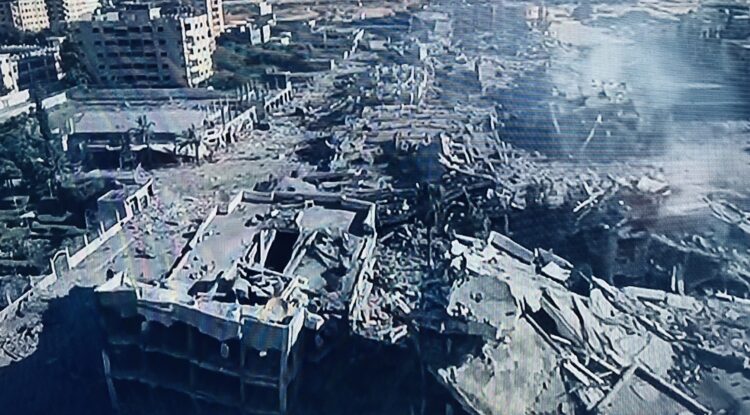The big unanswered question looming on the horizon following Hamas’ cold-blooded slaughter of 1,400 Israelis and foreigners in southern Israel on October 7 is deafeningly obvious.
When will the Israeli armed forces invade the Gaza Strip in an attempt to crush Hamas?
If Israel should launch a ground invasion, its objectives would be crystal clear: to dismantle Hamas’ military capabilities, eliminate its leadership, kill its foot soldiers, and remove it from power.
It is a tall order, but Israelis and their supporters are convinced that Israel has been left with no other alternative in light of the unprecedented massacre, which enraged Israelis to the boiling point, underscored Israel’s vulnerability, shattered its sense of security, and catapulted it into a new era of uncertainty.

Speaking to Israeli troops near Gaza recently, Prime Minister Benjamin Netanyahu said, “We are going to win with all our might. All of Israel is behind you. We are going to heavily strike our enemies and achieve victory.”
In short, Israel can no longer tolerate the presence of a hostile and aggressive statelet on its doorstep. Hamas, in league with Islamic Jihad, Iran and Hezbollah, constantly plots Israel’s destruction and has ignited countless skirmishes and five cross-borders wars with Israel in the past 17 years.

So the status quo ante is dead, though not yet buried, as Israel prepares for its biggest military operation since the 2006 war in Lebanon.
Needless to say, Israel utterly rejects the notion of an immediate ceasefire, which would rob it of the possibility of defeating Hamas. It is instructive that insistent calls for a truce come almost exclusively from the Palestinians and their sympathizers, who seek to preserve the status quo and the conditions that led to the October 7 pogroms.
The majority of Israelis expected an immediate retaliatory response from the Israel Defence Forces after some 3,000 heavily-armed Hamas terrorists stormed into Israel and murdered men, women, children and babies in a bloody orgy of unmitigated violence and mayhem that summoned up stark images of the Holocaust and Russian pogroms.
Israelis got it in the form of a ferocious Israeli air campaign, which has levelled parts of Gaza and caused the deaths of more than 5,000 Palestinians. But air power, while devastating, is no substitution for boots on the ground. Only an invading army can achieve the objectives Israel has set out.

Last week, Israeli Defence Minister Yoav Gallant disclosed that a ground invasion would occur soon. “You see Gaza from afar, but soon you will see it from the inside,” he told troops.
General Yaron Finkelman, the head of the Southern Command, has said that the expected offensive would be “difficult, long and intense.”
In the past, Israel has been quick to react to Palestinian terrorism.
Israel, in 1978, launched Operation Litani in southern Lebanon within days of a terrorist attack along the Haifa-Tel Aviv coastal road that claimed the lives of 38 Israelis.
Shortly after a Hamas suicide bomber killed 31 Israelis in Netanya in 2001, the Israeli army, in Operation Defensive Shield, temporarily reoccupied major Palestinian towns in the West Bank such as Ramallah and Nablus.
Within hours of a deadly Hezbollah ambush of an Israeli army patrol along the Lebanese border in 2006, Israel attacked Hezbollah in full force, setting off the second war in Lebanon since 1982.
Since October 7, however, the Israeli government has been slow to order an invasion of Gaza because the political and military terrain are so different and complicated.

Israel has mobilized a record number of 360,000 reservists to fight in Gaza and, if necessary, in Lebanon. To amass such a large fighting force and properly prepare it for the dangerous mission of urban combat in a highly congested area is a complex and time-consuming business.
Israel hopes that continual aerial strikes on Hamas and Islamic Jihad military bases, rocket and anti-tank missile sites and observation positions will soften up the areas it intends to attack and pave the way for a less costly invasion. In the meantime, Israel has been conducting operations inside Gaza to search for the bodies of missing Israelis and to clear the area for a ground invasion. On October 22, an Israeli soldier was killed during one such operation.
In addition, the Israeli government has required extra time to persuade one million Palestinian civilians in northern Gaza — which will probably bear the brunt of a massive incursion — to head southward. For obvious reasons, Israel does not want to inflict needless casualties on innocent Palestinians. Requiring human shields, Hamas has tried to block their flight, but close to 700,000 already have departed.
Another weighty factor that Israel must take into account is the position of the United States, its chief ally.
President Joe Biden has rallied behind Israel and has publicly expressed understanding and empathy for its desire to eradicate and topple Hamas. As he and his officials have said, Israel has an “obligation,” a “duty” and a “responsibility” to decapitate Hamas. In accordance with this policy, Biden has asked the U.S. Congress for a $14 billion aid package to Israel.
But under pressure from the liberal wing of the Democratic Party, certain European countries and Arab allies such as Egypt and Jordan, he has asked Israel to delay the invasion for an indefinite period. “While you may feel rage, don’t be consumed by it,” he said in a speech in Israel last week.
John Kirby, a Biden spokesman, said yesterday, “We are asking (Israel) what their answers are to the kinds of questions that any military ought to be asking itself, as it conducts operations.”
While demonstrating full throated U.S. support for Israel in public, the Biden administration has privately urged Israel to abide by a number of daunting conditions: to respect the laws of war and exercise restraint, to allow humanitarian aid to reach Palestinians, to ensure that Palestinian civilians are protected, and to buy time so that foreign and Israeli hostages are released before an invasion gets under way. In the past few days, four hostages have been released.

Last but not least, the Biden administration seeks to contain the war in Gaza so that it does not spill over into Lebanon or beyond, and to prop up U.S. forces in the region, including two aircraft carrier groups, in anticipation of further attacks on American interests. In recent days, U.S. troops in Syria and Iraq have been targeted by drone attacks initiated by Iranian proxies. And in the Red Sea, a U.S. naval vessel downed several drones fired from Yemen heading toward Israel.
Yesterday, The New York Times reported that the Biden administration fears that Israel lacks “achievable military objectives in Gaza, and that the Israel Defence Forces are not yet ready to launch a ground invasion with a plan that can work.”

U.S. Secretary of State Antony Blinken, meanwhile, has called on Israel to devise a post-invasion strategy that encompasses self-rule for the Palestinians.
Biden’s call for delay and/or restraint is annoying and a constraint to Israel, but his recommendation is not unusual insofar as U.S. policy is concerned.
On the eve of the 1967 Six Day War, President Lyndon Johnson urged Israel to refrain from firing the first shot and wait until he had assembled a multinational naval force to challenge Egypt’s blockade of the Strait of Tiran, Israel’s outlet to the Red Sea. Israel waited anxiously for three weeks before abandoning this strategy and destroying the Egyptian Air Force in a preemptive air strike that decisively affected the outcome of the war.
Prior to the 1973 Yom Kippur War, U.S. Secretary of State Henry Kissinger pressured Israel to cancel a preemptive attack to wipe out Egypt’s and Syria’s air defences.
And during the 1991 Gulf War, President George Bush dispatched Deputy Secretary of State Lawrence Eagleburger to Jerusalem to ensure that Israel exercised restraint and did not attack Iraq, which had launched 39 Scud missiles at Israeli cities. Prime Minister Yitzhak Shamir complied with the American request.
Thirty one years on, the United States again is asking Israel to restrain itself. But the clock is ticking and Hamas continues to fire barrages of rockets at Israel. So far, it has let loose with 7,400, 400 of which have not been intercepted by the Iron Dome missile defence system.
Given these existential circumstances, it appears that Israel has no intention of cancelling its plan to invade Gaza and eliminate Hamas. If Israel walks away from it under U.S. prodding, Hamas, Hezbollah and Iran will achieve a great strategic victory.
Judging by yesterday’s comments from its chief of staff, General Herzi Halevi, Israel has no intention of folding under U.S. pressure. Noting that the Israeli army is “very well prepared” for an offensive in Gaza, Halevi said, “We want to bring Hamas to a point of disintegration. Its leadership, its military wing. That is why we attack with great force. We are killing senior commanders, killing operatives, destroying infrastructure, and acting with great determination.”
In would appear that an Israeli invasion of Gaza is inevitable, U.S. objections notwithstanding. Hamas cannot be permitted to get away with mass murder.
But Israel needs a cogent exit strategy. Israeli troops cannot reoccupy Gaza indefinitely.
